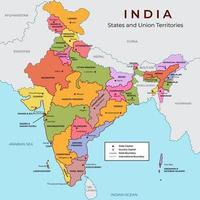
Vice President of India
Role and Responsibility : Vice President of India
The Vice President of India holds an important constitutional role in the government of India. The position is defined in the Constitution of India, and the Vice President is second in line to the President, making the role significant both in terms of responsibilities and duties. Here’s a detailed look at the Vice President’s role and responsibilities:
1. Constitutional Role and Powers:
The Vice President of India is the ex-officio Chairman of the Rajya Sabha (Council of States), the upper house of Parliament. This is a primary responsibility, and it entails several duties related to legislative functions.
A. Role as Chairman of Rajya Sabha:
- Presiding over Sessions: The Vice President presides over the meetings of the Rajya Sabha. During these sessions, the Chairman ensures the smooth functioning of debates and discussions.
- Maintaining Order: The Vice President ensures that the rules of procedure are followed, that discussions are orderly, and that members adhere to parliamentary norms.
- Casting Vote: In case of a tie during voting in the Rajya Sabha, the Vice President has the power to cast a decisive vote (casting vote).
- Deciding on Points of Order: As Chairman, the Vice President has the authority to decide on points of order raised by members during the Rajya Sabha sessions.
- Disciplinary Powers: The Vice President has the power to take disciplinary action against members of the Rajya Sabha for violations of parliamentary rules. This includes warning, reprimanding, or even suspending members for their conduct.
B. Succession to the Presidency:
- The Vice President is the first in line to become the Acting President in the event of the President’s death, resignation, or incapacitation. If the office of the President becomes vacant, the Vice President assumes the role of Acting President until a new President is elected.
2. Role in the Executive:
While the Vice President’s role in the executive branch is more symbolic, they hold an important position in the government’s functioning.
A. Assistant to the President:
- The Vice President often assists the President in ceremonial duties and is expected to represent the country in various national and international events.
- In case of the President’s absence or inability to perform duties, the Vice President temporarily takes over the President’s role.
3. Advisory Role:
- The Vice President of India has no direct role in the formulation of national policies, but they can provide advice or counsel to the President or the government on important matters.
- The Vice President may be consulted on certain matters, such as judicial appointments or matters requiring constitutional clarification.
4. Function in National Governance:
- While the Vice President does not participate in the formation of the Cabinet or the execution of laws, they do have a significant advisory and diplomatic function.
- They may also represent the President in events where the latter cannot attend.
5. Elections and Representation:
- The Vice President of India is elected by an electoral college, consisting of the elected members of both houses of Parliament (Lok Sabha and Rajya Sabha). This is a unique feature, and the election does not involve the general public.
- The Vice President represents India at various levels of government and may attend events like legislative functions, national celebrations, and international conferences.
6. Role During National Emergencies:
In the event of a national emergency, the Vice President, while not directly involved in decision-making, may play a key role in ensuring the continuity of government by acting as a standby in case the President is incapacitated.
7. Special Powers:
- Qualification for Presidential Election: The Vice President is eligible to run for the office of President of India, though they must resign from the office of Vice President if they wish to contest.
- Power to Call for Special Sessions: The Vice President, in consultation with the President, has the authority to summon special sessions of Parliament or call for extraordinary sittings of Rajya Sabha.
8. Diplomatic and Ceremonial Duties:
- The Vice President participates in diplomatic functions and state visits, representing India at important international events and helping build relations with other nations.
- The Vice President often attends state dinners, functions, and other official events as a representative of the government.
9. Impeachment and Removal:
The Vice President can be removed from office by a resolution of the Rajya Sabha (with the support of a majority in the Lok Sabha) on grounds of proven misconduct or incapacity. This is a rare and exceptional measure, typically not used except in the most extreme circumstances.
10. Conclusion:
While the Vice President of India holds a largely ceremonial and supervisory role in Parliament, their responsibilities also extend to acting as the President when necessary and offering advice on governance. The position is vital in maintaining the smooth functioning of India’s parliamentary democracy, providing leadership within the Rajya Sabha, and ensuring continuity in the executive branch.
Key Terms:
- casting vote ,
- Chairman ,
- electoral college ,
- executive role ,
- national duties ,
- parliamentary democracy ,
- President ,
- Rajya Sabha ,
- succession ,
- Vice President of India
Disclaimer: The information provided here has been compiled from various sources to the best of our knowledge. While every effort has been made to ensure the accuracy of the details, there may be occasional errors or omissions. If you find any discrepancies or incorrect information, kindly inform us so we can make the necessary corrections. Thank you for your understanding and cooperation.





